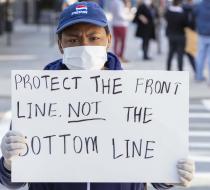Calling Me a Hero Only Makes You Feel Better 1 Favorite
Working in a grocery store has earned me and my co-workers a temporary status. After years of being overlooked, we suddenly feel a sense of responsibility, solidarity, and pride. On a private Facebook group page for my company, Trader Joe’s, one employee from Washington State posted a picture of a company-issued work shirt hanging from the ceiling of the store. A sign attached to the shirt read not all heroes wear scrubs.
I’m grateful to be acknowledged for the risky work we’re doing. Being in an environment where morale is up despite global uncertainty is encouraging. But I have a problem with all this hero talk. It’s a pernicious label perpetuated by those who wish to gain something—money, goods, a clean conscience—from my jeopardization.
Sometime in the second half of March, panic shopping was well under way, all nonessential businesses had already closed, and the nation was quickly adapting to shelter-in-place mandates. Though the sales floor at my store in Portland, Oregon, was swarming with customers, my boss announced an impromptu, drop-everything meeting in the back room. I assumed we would be given the order to shut down or shift to curbside pickup only.
Once we were all gathered in the back, seated on overturned milk crates, my boss removed a folded-up piece of paper from his pocket and began to read a letter from our company’s management that thanked us, presumptively, for our “confidence and steadiness” and offered our store a bonus. He quoted a customer who called our efforts “a lifeline.”
Before the close of the meeting, my boss led us in a round of applause for our own hard work and dauntlessness. Though I clapped, something didn’t sit right with me. Unlike medical personnel and emergency responders, we didn’t sign up for potentially life-threatening work. We can’t check the temperature of people entering our store or maintain a safe distance from one another. At the time that memo was read, we were discouraged from wearing masks, because their efficacy against the coronavirus was undetermined. I felt this advice had little to do with pointlessness and more to do with optics. Consumers wouldn’t feel comfortable coming into our store if it looked like the inside of an operating theater.
Since that backroom huddle, I have read daily about the newest essential frontline workers—bus drivers, people who work with the homeless community, and, mainly, grocery-store employees. The nation’s leaders and cultural influencers have been tweeting their praises. Every major news outlet has featured a story that has established us as heroes. “We ought to thank [supermarket employees] for their service, not blame them because market lines are long or inventory is low,” a Los Angeles Times article said.
I fear that many of my co-workers are so high on recognition and glorification, they can’t see the real danger they’re in. It troubles me to hear about people like Jason Hargrove, the Detroit bus driver who died less than two weeks after a passenger coughed openly on his bus, or about how New York City’s hardest-hit neighborhoods are low-income and full of the working poor. I’m afraid that when a grocery-store worker does fall ill, the measures taken in response might lack transparency.
Cashiers and shelf-stockers and delivery-truck drivers aren’t heroes. They’re victims. To call them heroes is to justify their exploitation. By praising the blue-collar worker’s public service, the progressive consumer is assuaged of her cognitive dissonance. When the world isn’t falling apart, we know the view of us is usually as faceless, throwaway citizens. The wealthy CEO telling his thousands of employees that they are vital, brave, and noble is a manipulative strategy to keep them churning out profits.
I have immense gratitude for my job. I love my co-workers like family. I respect the company that has employed me and given me excellent health-insurance benefits for more than 16 years. The anger I have is not toward my boss, or my boss’s boss, or even that guy’s boss. It’s toward an unfair system that will never change if we workers don’t question the motivations behind such mythmaking.
I have taken a temporary unpaid leave of absence because I can afford to. I know that many of our country’s essential workers aren’t so lucky. They don’t have a savings account or a second income or a family member to fall back on. They can’t shelter in place while working from home or collecting unemployment. If they stop showing up, they have no income to survive on, and may even lose health benefits or jobs altogether. Maybe they don’t work for a company with fair sick-leave practices or insurance qualifications. Maybe they aren’t guaranteed a job to return to when they’re feeling more physically and emotionally robust, when their city’s projected peak-infection date has passed.
I can't speak for every occupation, but for supermarket cashiers, I think the best way you can show your respect is by not showing up at all. Minimize your shopping outings, and make them quick and efficient. Please save the small talk for next year. And I beg of you, don't call my co-workers heroes as you wait for them to bag your carrot-cake muffins and face serum. They would trade places with you if they could.






